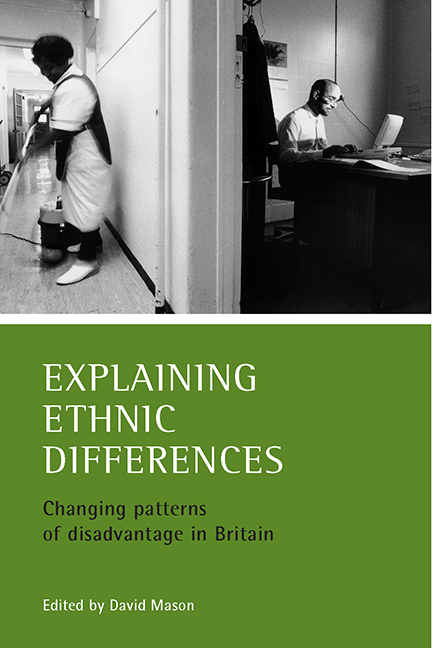Book contents
- Frontmatter
- Contents
- List of figures and tables
- Foreword
- Notes on contributors
- one Introduction
- two Changing ethnic disadvantage: an overview
- three The demographic characteristics of people from minority ethnic groups in Britain
- four Ethnic differentials in educational performance
- five Changing patterns of ethnic disadvantage in employment
- six Patterns of and explanations for ethnic inequalities in health
- seven Housing black and minority ethnic communities: diversity and constraint
- eight ‘All the women are white, all the blacks are men – but some of us are brave’: mapping the consequences of invisibility for black and minority ethnic women in Britain
- nine Police lore and community disorder: diversity in the criminal justice system
- References
- Index
five - Changing patterns of ethnic disadvantage in employment
Published online by Cambridge University Press: 20 January 2022
- Frontmatter
- Contents
- List of figures and tables
- Foreword
- Notes on contributors
- one Introduction
- two Changing ethnic disadvantage: an overview
- three The demographic characteristics of people from minority ethnic groups in Britain
- four Ethnic differentials in educational performance
- five Changing patterns of ethnic disadvantage in employment
- six Patterns of and explanations for ethnic inequalities in health
- seven Housing black and minority ethnic communities: diversity and constraint
- eight ‘All the women are white, all the blacks are men – but some of us are brave’: mapping the consequences of invisibility for black and minority ethnic women in Britain
- nine Police lore and community disorder: diversity in the criminal justice system
- References
- Index
Summary
Introduction
In Chapter Four, we saw that significant changes were occurring in the experiences of minority ethnic groups in the education system. The pattern of upward mobility revealed in that chapter runs counter to many taken-for-granted assumptions, including those surrounding the supposed persistence of ‘educational underachievement’ (see Mason, 2000, pp 62-78). This is not to deny, of course, that significant inequalities persist. They relate to two key themes of this book: the increasingly differentiated experiences of Britain's minority ethnic citizens and the persistence of disadvantage relative to the ‘white’ population.
It is arguable that labour market position and employment status are central issues in understanding differences in the experiences of Britain's minority ethnic groups. This is because the resources that derive from employment are keys to accessing a range of other desired goods and services. The extent to which this is so is illustrated by the analyses of both health and housing presented in Chapters Six and Seven of this volume. It is no surprise then, to find that members of minority ethnic groups identify labour market success as key aspects of their life strategies. In this context, Modood's analysis in Chapter Four emphasised the extent to which the apparent drive by young minority ethnic people to acquire qualifications is a response to the labour market experiences of their parents and their own perceptions of the patterning of opportunities open to them. In this regard, education can be seen, in some respects, as representing an investment in labour market futures. As we shall see, the patterning of that investment is, to some degree, reflected in the labour market experience of different groups. Yet at the same time, it is clear that the returns on that investment are not equivalent for all groups. There is, as we shall see, evidence of a continuing ethnic penalty that operates notwithstanding substantial occupational mobility among members of at least some groups. This penalty relates not only to the kinds of jobs that can be accessed. It also has implications for financial returns to employment in the form of incomes.
This last point is crucial because, as we shall see, employment patterns interact with other aspects of individual and family strategies, shaping significant differences between the household incomes of different groups.
- Type
- Chapter
- Information
- Explaining Ethnic DifferencesChanging Patterns of Disadvantage in Britain, pp. 69 - 86Publisher: Bristol University PressPrint publication year: 2003



